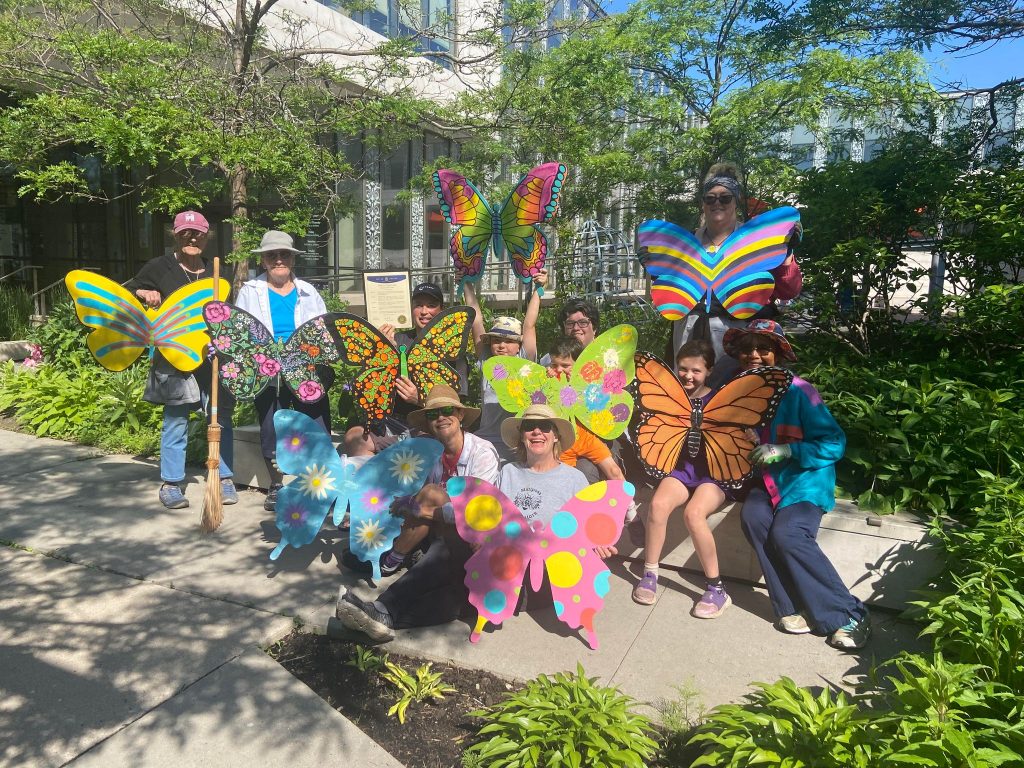The streets of Orillia are alive with Pollinator Plants – or at least lively paintings of local pollinator-friendly species.
In addition, Orillia Horticulture Club, Mariposa Pollinators, and Streets Alive teamed up Monday to add native pollinator plants to the Orillia Public Library gardens. A kaleidoscope of butterflies painted by Streets Alive artists in 2020 caught the attention of passers-by as the groups came together to get Pollinator Week 2024 off to a flying start.
Mariposa Pollinators member Matt Thomson read a City of Orillia Proclamation for National Pollinator Week.
Orillia joins other cities nationwide in celebrating Pollinator Week, an annual celebration in support of pollinator health initiated by Pollinator Partnership, that has since spread throughout North America.
Pollinator awareness focuses on supporting native pollinators, especially insects, through the stewardship of habitat. Seeding and planting of plants native to the local environment helps support pollinator species such as butterflies and bees.
“Pollinator species such as bees, butterflies, moths, and other insects are essential partners of farmers and ranchers in providing much of our food supply;…pollinators provide significant environmental benefits that are necessary for maintaining healthy ecosystems,” reads the City of Orillia Proclamation for National Pollinator Week June 17 to 23, 2024.
The proclamation comes just in time for Streets Alive Productions’ ‘Pollinator Friendly’ installation. Artistic representations of sixty native pollinator flowers are displayed throughout Orillia’s downtown. The annual Streets Alive public art display has in past years featured bicycles, sailboats, and most recently, guitars honouring Gordon Lightfoot.
“The ‘Pollinator Friendly’ public art project highlights the importance of native flowers as the best option in our gardens. The colour and beautiful designs painted by local artists brightens the streetscape and helps educate the community on which flower species attract the bees, butterflies, and wide variety of pollinators that ensure a healthy ecosystem,” says Streets Alive founder Leslie Fournier.
To learn more about local pollinators, the Mariposa Bio Blitz Project invites residents to snap photo observations of pollinating insects and birds. Participants can share their observations on iNaturalist throughout Pollinator Week, June 17-23. “This is a cool way to help real scientists. I love the fact that anyone can do this, and each observation becomes a data point,” says Mariposa Pollinators member Gavy Swan. To participate, sign up for a free iNaturalist account and search for the Mariposa Bio Blitz Project 2024.
Youth-led group ‘Monarch Squad’ joins Mariposa Pollinators to present the One Plant Challenge: plant at least one native pollinator flower in your yard, garden, or balcony. “If everyone in Orillia planted one pollinator plant, that’d be thousands of new plants to feed bees and butterflies!” says Monarch Squad co-founder Morgan Mansfield, 10. Participants can share proof they met the challenge using #OnePlantChallenge on social media. “We hope people do the challenge because it will help grow habitat to keep our pollinators alive, and it’s good for the environment,” adds Monarch Squad co-founder Phoenix Ormson, 9. “You should just do it.”
Mariposa Pollinators will be adding a Native Plant Seeds collection to the Orillia Public Library Seed Library, Thursday. The Orillia Seed Library allows people to sign out up to 3 seed packages per person for free. Patrons are encouraged to collect seeds from the plants grown and return them to the seed library to share with others.
“We’re always trying to make native plant seeds available to people. And I believe the Orillia Seed Library usually has some on hand. But now they can be clearly identified as native plants to make them easy to find.” says Swan. Making these seeds available “increases community engagement with conservation efforts, and helps preserve our native plants biodiversity and genetics,” adds Mariposa Pollinators member Jennifer Bayley. “It’s one more way we can come together for the common goal of supporting wildlife and their habitats.”
Pollinators and you
In Canada, pollinators include bees, butterflies, moths, beetles, and hummingbirds, among others.
Supporting our native pollinators has never been more important, as they provide significant environmental benefits that are essential to maintaining healthy ecosystems. In fact, they’re responsible for 1 in every 3 bites of food we eat.
There are roughly 400 species of native bees across Ontario that are solitary, ground nesting, and are small enough that they don’t have stingers. Bees are often confused with wasps, though wasps tend to be more aggressive predatory insects.
There are more than 100 species of butterflies and over 3,000 species of moths across the province. Moths are often referred to as “the night shift” as they’re busy visiting blooms while we’re sleeping at night.
In southern climates bats play a role in pollination and visit desert blooms like blue agave, which is the base ingredient for tequila.
Climate change has put pollinators in jeopardy around the world.
The best way to support our pollinating insects is by incorporating native perennials into your garden, as most of them rely on these plants for foraging, reproduction, and habitat. These relationships have been long standing over millennia. Once established, native plants require less watering and are adaptable to droughts.
Look for native plants at your local garden centre, or search out a plant nursery that specializes in native plants. Take advantage of local seed giveaways, seed libraries, and native plant initiatives.
